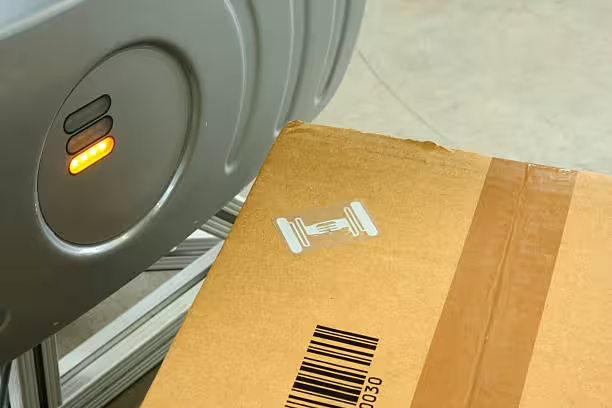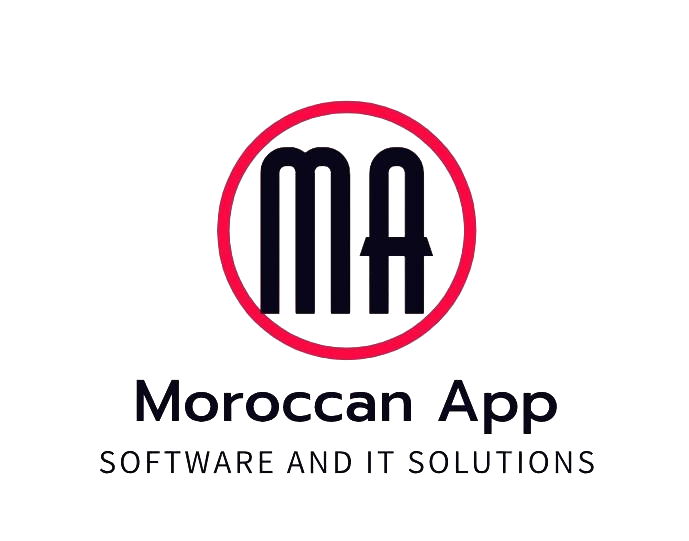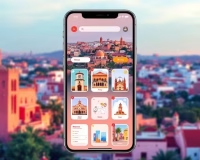- Mon - Sat 8:00 - 17:30, Sunday - CLOSED

How to Use RFID in Morocco: Complete Guide
RFID technology is rapidly transforming the business landscape in Morocco. Moroccan companies are adopting this radio frequency identification solution to improve their operational efficiency. This technology is becoming a key element of digital transformation in several sectors, from agriculture to logistics. This comprehensive guide examines the practical applications of RFID in Morocco and its benefits for businesses. Readers will discover the steps to implement an RFID system, best practices for inventory management, and solutions tailored to Moroccan SMEs. The article also addresses the current challenges and future prospects of this technology in the Moroccan context. Understanding RFID Technology Radio Frequency Identification (RFID) represents a major advance in the field of automatic identification. This technology uses radio waves to store and retrieve data remotely, offering remarkable possibilities for managing and tracking objects. The RFID system is based on two essential components: tags (or labels) and readers. RFID tags, consisting of an electronic chip and an antenna, can store up to 64,000 bits of data, allowing precise and detailed identification of objects. There are three main types of RFID tags: RFID technology is distinguished by its ability to read hundreds of tags simultaneously per second, without requiring a direct line of sight between the reader and the tag. Data can not only be read but also modified or rewritten, providing exceptional flexibility in information management. A complete RFID system also integrates a middleware that processes the collected data and transmits it to the company’s information system. This architecture allows for automated and efficient data management, contributing to improved traceability and inventory management. RFID Applications in Morocco In Morocco, RFID technology is revolutionizing many sectors of activity, offering innovative solutions for operations management. In the supply chain field, this technology enables real-time visibility and efficiency, eliminating errors throughout production, warehousing and distribution operations. The main applications of RFID in Morocco include: In the industrial sector, RFID allows companies to track their products at every stage of production and marketing. RFID tags offer significantly greater storage capacity than traditional barcodes, allowing to process up to 100 tags per second. The technology is also transforming retail. Moroccan retailers are using RFID to automate their inventories and reduce stockouts. RFID gates installed at the entrance and exit of stores provide effective protection against theft. This solution not only optimizes inventory management but also significantly improves the customer purchasing experience. In logistics, Moroccan companies are seeing a significant improvement in their operational efficiency. The technology makes it possible to synchronize physical flows with information flows, providing complete traceability and better anticipation of supply chain malfunctions. Implementation of an RFID system Implementing an RFID system requires a methodical and well-planned approach to ensure its success. Companies should follow a structured process that begins with a thorough pre-study phase to choose the RFID technology that best suits their specific needs. Essential implementation steps include: To ensure successful integration, several critical factors must be considered: End-user involvement is crucial, because the best technological system only works if users comply with its operating mode. Success is based on the combination of three fundamental parameters: the choice of the appropriate RFID standard, the establishment of a precise operating mode, and effective change management. The reliability rate of the system can be optimized thanks to a well-defined and integrated operating mode. Companies must also plan the modification of the activity’s IT management system and promote the rapprochement of several actors around the RFID project. Challenges and future prospects of RFID in Morocco Despite its transformative potential, the deployment of RFID in Morocco faces several significant challenges. The implementation cost remains a major obstacle, with RFID tags costing between ten cents and one euro, five to ten times more expensive than traditional barcodes. Key technical challenges include: Nevertheless, the future prospects are promising. The market for IT equipment for logistics in Morocco is experiencing an impressive growth of 30% to 40% per year. The country’s strategic geographical position, including its proximity to the Eurozone, offers significant opportunities for the expansion of RFID technology. Environmental ambitions are also supporting RFID adoption, with national targets to reduce CO2 emissions by 35%. This technology is perfectly aligned with the national strategy for the development of logistics competitiveness, which emphasizes modernization and operational efficiency. The Tanger-Med port plays a crucial role in this transformation, serving as a strategic hub for the flow of goods to Europe, America, West Africa and Asia. This infrastructure, combined with the flexibility of the Moroccan workforce, positions Morocco as a key player in the adoption of RFID technologies on a regional scale. Conclusion RFID technology marks a decisive step in the modernization of Moroccan companies. Radio frequency identification solutions demonstrate their added value across various sectors, from inventory management to product security. The positive results observed in companies that have adopted this technology confirm its essential role in improving productivity and reducing operational costs. Morocco is positioning itself as a major player in the adoption of RFID technologies in Africa, driven by its strategic geographical location and modern infrastructure. Despite the initial implementation challenges, future prospects remain promising, supported by the continued growth of the logistics market and government initiatives in favor of digital transformation. Moroccan companies that are investing in RFID today are giving themselves the means to effectively meet the growing demands for traceability and operational efficiency. FAQs Q: How can I use an RFID card?A: To use an RFID card, simply pass it in front of an RFID reader. This contactless system allows, for example, to recharge an electric vehicle while securing access and payment. Q: What are the steps to activate RFID on a device?A: To activate RFID, you must first activate the network on a smartphone via the Settings/Networks menus. Then, install an application like NFC Tools on Android, bring the smartphone within 10 cm of the RFID tag and program the desired action. Q: How does RFID access work?A: The RFIDpassive, which does not have a battery, works in read-only mode. The reader sends an electromagnetic signal to

RFID Technology in Morocco: Applications and Innovations
RFID Technology (Radio Frequency Identification) is gaining popularity in Morocco. It is a game-changer in industry and commerce, offering innovative solutions that make operations more efficient. It also helps with better stock management and tracking assets and the supply chain. Moroccan businesses are using these advancements to modernize and become more competitive. RFID technology is used in logistics and inventory management, and it also enhances the customer experience in stores. It is transforming the way products are tracked and controlled. The integration of RFID with the Internet of Things (IoT) and cloud solutions is opening new doors. This allows Moroccan companies to engage in innovation and digital transformation. Key Takeaways Current State of RFID Technology in Morocco Morocco is becoming a leader in the use of RFID technology. This revolutionary technology enhances efficiency and customer experience across multiple sectors. The implementation of RFID is becoming increasingly common. Adoption Across Different Sectors RFID technology is becoming more popular in Morocco. It is used in: Existing Technological Infrastructure Morocco has a developing RFID infrastructure, which includes: Key Market Players The Moroccan RFID market is driven by several key players, including: Companies Areas of Expertise Company X Design of RFID systems for logistics and traceability Company Y Integration of RFID solutions into enterprise information systems Company Z Manufacturing and distribution of RFID tags and readers tailored to local needs These smart technology solutions in Morocco based on RFID technology open new perspectives. They are gradually transforming practices in many sectors. Industrial and Logistics Applications RFID technology is very useful in industry and logistics in Morocco. It helps better manage inventory, track products, and improve production. RFID in Logistics and Supply Chain RFID in logistics and supply chain makes goods more visible. Companies in Morocco can better control their inventories. This reduces errors and improves stock management. RFID in the Manufacturing Sector In the manufacturing sector, RFID is essential. It automates production and tracks assets in real time. This optimizes processes, reduces downtime, and improves quality. Advantages of RFID in Industry Application Examples Product traceabilityOptimized inventory managementProcess automationError reductionQuality improvement Tracking shipments and deliveriesAsset and equipment managementProduct quality controlProduction line optimizationSecuring storage areas Companies in Morocco are increasingly using RFID. They aim to be more efficient, productive, and competitive in the market. “RFID has transformed our supply chain, allowing us to accurately track our products and respond quickly to customer demands.” – CEO, Automotive Manufacturing Company RFID in Moroccan Retail RFID technology is crucial for the digital transformation of retail in Morocco. It helps manage inventory, improve customer experience, and prevent losses. Moroccan retailers are increasingly adopting it. Inventory Management Solutions RFID tags and readers allow merchants to track their inventory in real time. This optimizes shelf management. Increased visibility reduces stockouts and improves item turnover. Enhanced Customer Experience Using RFID technology makes shopping smoother. Customers benefit from a personalized experience. Features like automatic item detection at checkout make purchasing easier. Loss Prevention RFID allows precise tracking of inventory and movements. This helps prevent theft and restocking errors. The technology optimizes margins and improves profitability. RFID solutions offer many advantages to retailers in Morocco. They transform the shopping experience and improve inventory management and profitability. Digital Transformation of Moroccan Businesses Digital transformation in Morocco is advancing rapidly. Companies are adopting RFID technology to boost their digitalization. This technology enhances efficiency, decision-making, and innovation. RFID helps Moroccan companies automate their operations. This reduces errors and optimizes stock management. Leaders can make informed decisions thanks to real-time data. RFID also paves the way for innovation. It enables the development of traceability solutions and improves customer experience. It’s a major asset for the digital transformation of Moroccan companies. “RFID is a key element of digital transformation, enabling companies to increase their efficiency and competitiveness.” Morocco is engaging in its digital transformation. RFID technology is essential for the digital transformation of businesses. It offers numerous strategic and operational advantages. Traceability and Real-Time Tracking Solutions RFID tracking solutions are changing asset management for Moroccan companies. They enable real-time tracking of key elements, improving quality control and helping to make better decisions. Asset Tracking Systems RFID asset tracking systems help locate and monitor equipment and resources. This reduces losses and improves asset utilization. Supply Chain Management Using RFID technology in the supply chain ensures perfect traceability. It enhances forecasting, inventory management, and logistics flow coordination. Quality Control RFID tracking solutions allow for real-time monitoring of product quality. This helps identify and quickly address issues, ensuring product quality. “RFID technology has revolutionized how we manage our assets and supply chain. We’ve significantly improved our operational efficiency and customer satisfaction.” – Operations Manager, Moroccan Logistics Company Security and Authentication with RFID RFID technology is crucial for security and authentication in Morocco. It helps combat counterfeiting and secures access to locations. Additionally, it protects official documents. Counterfeit Protection RFID enables automated tracking of products, preventing the circulation of counterfeit goods. This technology is widely used in luxury and electronics sectors to protect brands. Secure Access Control RFID authentication systems are common for access control. They are used in businesses and government buildings. RFID badges quickly identify authorized individuals and block unauthorized access. Securing Official Documents RFID also secures identity documents and passports. RFID chips instantly verify the authenticity of these documents, reducing the risk of forgery. RFID technology enhances security and authentication across various fields in Morocco. It is seen as a promising emerging technology. Recent Innovations and Developments The Moroccan RFID technology market is booming, with numerous innovations transforming industries. These advancements are paving the way for exciting new applications. Moroccan companies are exploring the latest advancements, aiming to improve efficiency, traceability, and customer experience through integration with the Internet of Things (IoT) and cloud computing. New Applications RFID is increasingly used in sectors like healthcare, agriculture, and transportation. For example, RFID bracelets monitor patients’ health in real time, while RFID sensors enhance crop production and traceability in agriculture. IoT Integration Cloud Solutions Moroccan companies are adopting cloud-based RFID solutions, benefiting



